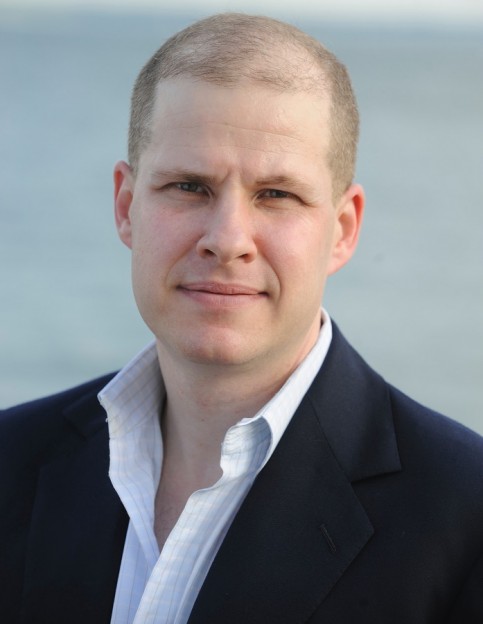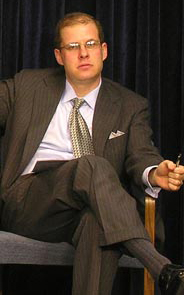Max Boot Quotes
In Iraq, Sunnis need to be offered a Sunni regional government, akin to the Kurdish regional government, with its autonomy protected by its own militia and ultimately guaranteed by the United States. If Baghdad won’t go along, the U.S. should bypass Baghdad and directly arm and train the Sunni tribes. In Syria, Sunnis need to be offered a future in which they won’t be terrorized by Assad and Shiite militias. – Nov. 22, 2015 article in LA Times, “Islamic State’s Achilles Heel: Its Sunni Identity”
Although not as potent a fighting force as Hezbollah or the Taliban, ISIS is an even bigger threat to the United States and its allies because it has attracted thousands of foreign fighters who could return to commit acts of terrorism in their homelands. – Council on Foreign Relations article titled “Defeating ISIS”
To defeat ISIS, the president needs to dispatch more aircraft, military advisors, and special operations forces, while loosening the restrictions under which they operate. The president also needs to do a better job of mobilizing support from Sunnis in Iraq and Syria, as well as from Turkey… – Council on Foreign Relations article titled “Defeating ISIS”
Impose a no-fly zone over part or all of Syria. ….There are legitimate concerns that overthrowing Assad now, before the Syrian opposition is ready to fill the vacuum, would be counterproductive and potentially pave the way for a jihadist takeover of all of Syria. But instituting a partial or even a complete no-fly zone would not lead to Assad’s immediate ouster. It would, however, facilitate the moderate opposition’s ability to organize an administration capable, with international help, of governing Syria once Assad finally goes. – Council on Foreign Relations article titled “Defeating ISIS”
Prepare now for nation-building….the United States should propose to permanently station troops in the Kurdistan Regional Government. This is not necessarily synonymous with Kurdish independence, but the United States should give serious consideration to dropping its longtime opposition to the creation of a Kurdish state or possibly even two—one in Syria and one in Iraq. – Council on Foreign Relations article titled “Defeating ISIS”
“The NSA is gathering that information to keep us safe from terrorist attackers. Yet somehow its actions have become a “scandal,” to use a term now loosely being tossed around.” – June 2013 LA Times column, “Stay calm and let the NSA carry on”
“The real scandal here is that the Guardian and Washington Post are compromising our national security by telling our enemies about our intelligence-gathering capabilities.” – June 2013 LA Times column, “Stay calm and let the NSA carry on” (MORE HERE)
I suppose some on the right would join him in denouncing the UN, but what about the IMF, World Bank, and WTO? Generally I think most conservatives are Hamiltonian (one of the Founding Fathers whom Paul doesn’t mention) and believe that we gain from such trade and economic arrangements, which, yes, restrict sovereignty to some small degree but in the process immeasurably benefit the United States by curtailing tariffs and other obstacles to economic growth.
No doubt we will soon be hearing, if we aren’t already, that CIA drone strikes in Pakistan are responsible for the aborted Times Square bombing, which is linked to the Pakistani Taliban. If only we weren’t targeting the terrorists, some will argue, they wouldn’t target us. – “We’re not to blame for Pakistani terrorists” May 5, 2010 Commentarymagazine.com
It is fanciful to imagine that we could ever do anything to appease such fanatical groups. The very fact that we support moderate governments in Islamabad and Kabul is enough to earn us their undying enmity. Curtailing the drone strikes won’t earn their gratitude; it would simply signal to them that we can be intimidated. The best response to the Times Square attempted attack is to keep sending our robotic aircraft after the bad guys. This is by far the most effective program we have to address the terrorist threat inside Pakistan. – “We’re not to blame for Pakistani terrorists” May 5, 2010 Commentarymagazine.com
Faced with such a flagrant casus belli [Iranian support of insurgents in Iraq], not to mention President Mahmoud Ahmadinejad’s blood-curdling threats against our ally, Israel, the United States would be perfectly justified in hitting Iran now, before it acquires nuclear weapons. But that doesn’t necessarily mean that such an attack is the best strategy at the moment or the one that the administration is pursuing. – “Keeping Iran in line”, 2007 article LA Times
Only if the Iranians fear the U.S. are they likely to make major concessions. The Bush haters are thus doing Bush a big favor with all their talk of an imminent American strike. The more alarmism, the better — justified or not. – “Keeping Iran in line”, 2007 article LA Times
Attempts by numerous naysayers to deny the evidence of Iranian involvement in Iraq are almost comical. – “Keeping Iran in line”, 2007 article LA Times
You would think that the United States was Nazi Germany preparing to launch a war of aggression on Poland based on a fabricated provocation. (Adolf Hitler’s Sept. 1, 1939, blitzkrieg was preceded by SS troops in Polish uniforms pretending to attack a German radio station on the border.) In reality, it is the United States and our allies that are the victims in the confrontation with Iran. – “Keeping Iran in line”, 2007 article LA Times
I eagerly await the righteous indignation from the Plame Platoon about the spilling of secrets in wartime and its impassioned calls for an independent counsel to prosecute the leakers. And wait….And wait….I suspect it’ll be a long wait because the rule of thumb seems to be that although it’s treasonous for pro-Bush partisans to spill secrets that might embarrass an administration critic, it’s a public service for anti-Bush partisans to spill secrets that might embarrass the administration. – December 21, 2005 LA Times article “Plame Platoon is AWOL on New Leaks”
The determination of which secrets are OK to reveal is, of course, to be made not by officials charged with protecting our nation but by journalists charged with selling newspapers. – December 21, 2005 LA Times article “Plame Platoon is AWOL on New Leaks”
The president has an even stronger moral case. Before condemning him, ask yourself why there have been no terrorist attacks on American soil since 2001. Not one. It’s hard to know the exact reason we’ve been spared, but surely part
of our good fortune should be attributed to the very measures — the Patriot Act, the NSA surveillance, the renditions, the enhanced interrogation techniques — that are now being pilloried by self-righteous journalists and lawmakers. – December 21, 2005 LA Times article “Plame Platoon is AWOL on New Leaks”
“We need to be more assertive and stop letting all these two-bit dictators and rogue regimes push us around and stop being a patsy for our so-called allies, especially in Saudi Arabia.” – Washington Monthly interview, 2003
I remember following in the late seventies, early eighties, the debates over the neutron bomb and Pershing IIs and cruise missiles, and all this kind of stuff. And that, basically, taught me the importance of foreign affairs. This was not something you could run away from. We had a moment of illusion after the end of the Cold War — this moment of false serenity after the collapse of the Berlin Wall, and we could suddenly shut out the world and imagine that everything would be fine, and freedom and liberty would progress inextricably around the world no matter what we did. That was an illusion, and an illusion that was rudely shattered on 9/11. But I’ve been interested in foreign affairs from the start, and I’m glad to see that the rest of the country seems to be catching up. – 2003 interview with Harry Kreisler and Thomas Barnes (on Foreign Policy)
Often when American troops are sent somewhere, you hear very many warnings about the possible cost of failure. And that’s appropriate; people are afraid of another Vietnam. But it’s also important to keep in mind the cost of inaction. – 2003 interview with Harry Kreisler and Thomas Barnes (on Small Wars)
In the case of Bolshevism, where people like Winston Churchill, who was a minister in the British Cabinet at the time, and General Ferdinand Foch and various others thought there was a real opportunity to strangle the Bolshevik baby in its crib, it didn’t happen. As a result, untold horrors unfolded for Russia and the world. That was truly a terrible lost opportunity, where a small war, if pursued a little bit more aggressively, could have changed the course of history. – 2003 interview with Harry Kreisler and Thomas Barnes (on Small Wars)
If you look at the history, we have violated pretty much every tenet of the Powell Doctrine, this notion promulgated by Colin Powell when he was Chairman of the Joint Chiefs, that basically we should only fight big wars and we should only do war with overwhelming force if we’re going to win a total victory, and then leave immediately. That has seldom been the way we have fought wars. If you look at the historical pattern, we violated all of that. American troops have often been used as “social workers.” American troops have often stayed in theaters abroad indefinitely. They were deployed in China pretty much continuously from the 1840s to the 1940s, roughly one hundred years, with no exit strategy in sight. Those kinds of examples you can multiply many times. All these things that people assume are the natural order of things are, in fact, a myth. If you look at the history, it clearly shows that it’s not the case, that’s not the way it’s been. – 2003 interview with Harry Kreisler and Thomas Barnes (on Small Wars)
The military since day one has been involved in nation-building activities, and often very successfully, but that history tends to get overlooked. – 2003 interview with Harry Kreisler and Thomas Barnes (on Small Wars)
And they came out of Vietnam saying, “Never again. We’re never going to repeat this kind of fiasco.” They didn’t come out of it saying, “We’re going to figure out a better way to fight next time.” They just wanted to avoid these kinds of messy, low-level interventions altogether. And that’s the essence of the Powell Doctrine: “We’re not going to fight these low-level wars ever again. If we ever use force, it’s going to be massive, overwhelming. We’re going to win instantly and then go home via an exit strategy.” That’s the essence of the Powell Doctrine. – 2003 interview with Harry Kreisler and Thomas Barnes (on Learning the Wrong Lessons from Vietnam)
In places like that, or more recently, Afghanistan, you can’t just win a massive overwhelming victory and go home, because if you do, the fruits of victory will crumble before your eyes. So you ought to have a longer-term intervention, if you’re going to create a stable political order. We’ve been doing that since the early days of the republic, but it’s very much outside the ethos of the Powell Doctrine. – 2003 interview with Harry Kreisler and Thomas Barnes (on Learning the Wrong Lessons from Vietnam)
Do you think that our forces now are configured to fight the kind of engagements that are now required, where I guess in your terms you would say that the American empire has to do its business and meet its responsibilities? A: The thin green line on the edge of the empire protecting our interests while America sleeps! – 2003 interview with Harry Kreisler and Thomas Barnes (on US Foreign Policy in the post-9/11 World)
On Iraq invasion: I am confident that our forces will be victorious in relatively short order, for two reasons: one is our overwhelming technological advantage, which has only grown since the 1991 Gulf War; and the second is our tremendous manpower or, if you like, person-power advantage, which is that we have these superbly trained troops who are much more motivated, much more trained, and much more battle-ready than anything the Iraqis can throw against them. I think the combination of that will lead to overwhelming victory. – 2003 interview with Harry Kreisler and Thomas Barnes (on US Foreign Policy in the post-9/11 World)
…when American troops entered Paris, where they enter Pristina, where they entered Kabul, or, shortly, Baghdad, we are greeted as liberators, not as oppressors, because people know that we do not come to establish an empire, we come to give them freedom. That is a tremendously potent tool that we can use to the fullest, and we should use to the fullest. Any foreign policy that doesn’t take advantage of that is not being truly “realistic,” because there’s a school of “realist” foreign policy which eschews idealism and wants to concentrate on hard power. – 2003 interview with Harry Kreisler and Thomas Barnes (on US Foreign Policy in the post-9/11 World)
The reason why soft power works, the reason why peaceful commerce takes place, the reason why we can have this interchange with the world, is because America serves as the global policeman. We are guaranteeing and underwriting the security of this world order. – 2003 interview with Harry Kreisler and Thomas Barnes (on US Foreign Policy in the post-9/11 World)
I think the Wilsonian stand has always been very strong in American foreign policy. People don’t often think of him this way, but Ronald Reagan was one of our great Wilsonian presidents. He championed these ideals and talked about tearing down the [Berlin] Wall, and championed human rights in the Soviet Union, and did all these kinds of things, which turned out to be very powerful weapons in bringing down our adversaries in the Soviet Union. That strain was absent, largely, from the first Bush administration, much to their detriment. – 2003 interview with Harry Kreisler and Thomas Barnes (on US Foreign Policy in the post-9/11 World)
Bill Clinton was fairly Wilsonian, but I don’t think he was very adept at deploying the power necessary to champion these American ideals. George W. Bush has struggled with this a little bit. He came into office very wary of nation-building and some of these other constructs that offend a realpolitik conception of foreign policy. But since 9/11 he’s changed his views, and that was the pivotal event that led him to see that we have to be more aggressive about exporting our ideals, because we cannot live with the status quo in the Middle East. The status quo in the Middle East is killing us, literally, and we have to change it before another 9/11 occurs. – 2003 interview with Harry Kreisler and Thomas Barnes (on US Foreign Policy in the post-9/11 World)
We have to be very wary of the limits of power and use our power wisely. But at the same time, I do think that our idealism is a powerful force, not only for good but for American interest. People talk about the dangers of imperial over-stretch and getting overcommitted and all that kind of stuff, and that’s legitimate to think about that. But we also need to think very hard about the dangers of undercommitment and not being strong enough to defend our interest. In the 1920s and 1930s, we saw a good example of what happens when there is no global policeman, when Britain essentially abdicated its pre- World War I role of serving as the benevolent hegemon of the international system, and America did not choose to enter the void. – 2003 interview with Harry Kreisler and Thomas Barnes (on US Foreign Policy in the post-9/11 World)
…it’s a mistake to think that if we take strong action against the terrorists and the Islamic fanatics, that this will cause an uprising among the “Arab street” and will turn the whole Muslim world against us. I don’t think that’s what history shows. If you look at the past decade, al Qaeda rose to prominence in the 1990s when America was pursuing the policy of trying to placate the Muslim street. We were pursuing the Arab – Israeli peace process. We were not striking back very hard at terrorists. We were allowing Afghanistan to become a training ground for terrorists and not invading it. We were doing our best not to include Iraq, and it only earned us their contempt. In their writings, Osama bin Laden talks about America as a paper tiger, that we’re toothless. “If you kill a few Americans, you can chase them out of your country.” He has contempt for us. He thinks that he defeated the Great Empire, the Soviet Union, and we’re an easy case by comparison. We’re next. If he can knock off the Soviets, he can certainly knock us off. – 2003 interview with Harry Kreisler and Thomas Barnes (on US Foreign Policy in the post-9/11 World)
Well, as President Bush said, “You’re either with us or you’re against us.” Those are words to live by, and they’re words that the Saudis should keep in mind, in particular, because they’ve played a double game for several decades now — on the one hand, professing great friendship to the United States, and in some ways really helping us out on some things, but at the same time, opening up their checkbooks and writing checks to the most hateful madrasas around the world… – 2003 interview with Harry Kreisler and Thomas Barnes (on US Foreign Policy in the post-9/11 World)

















